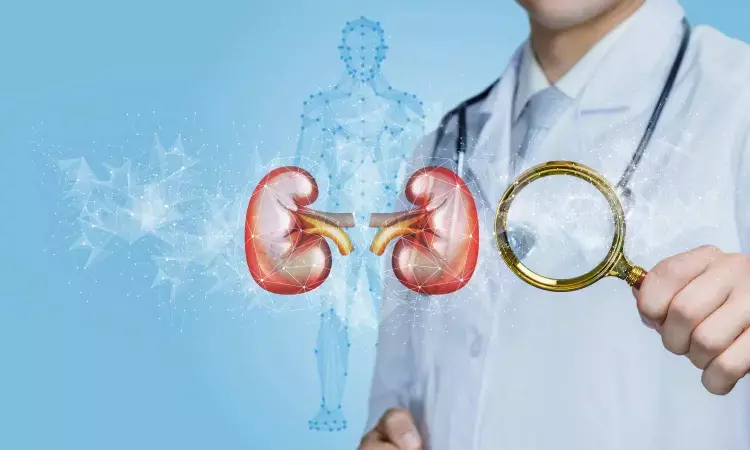- Home
- Medical news & Guidelines
- Anesthesiology
- Cardiology and CTVS
- Critical Care
- Dentistry
- Dermatology
- Diabetes and Endocrinology
- ENT
- Gastroenterology
- Medicine
- Nephrology
- Neurology
- Obstretics-Gynaecology
- Oncology
- Ophthalmology
- Orthopaedics
- Pediatrics-Neonatology
- Psychiatry
- Pulmonology
- Radiology
- Surgery
- Urology
- Laboratory Medicine
- Diet
- Nursing
- Paramedical
- Physiotherapy
- Health news
- Fact Check
- Bone Health Fact Check
- Brain Health Fact Check
- Cancer Related Fact Check
- Child Care Fact Check
- Dental and oral health fact check
- Diabetes and metabolic health fact check
- Diet and Nutrition Fact Check
- Eye and ENT Care Fact Check
- Fitness fact check
- Gut health fact check
- Heart health fact check
- Kidney health fact check
- Medical education fact check
- Men's health fact check
- Respiratory fact check
- Skin and hair care fact check
- Vaccine and Immunization fact check
- Women's health fact check
- AYUSH
- State News
- Andaman and Nicobar Islands
- Andhra Pradesh
- Arunachal Pradesh
- Assam
- Bihar
- Chandigarh
- Chattisgarh
- Dadra and Nagar Haveli
- Daman and Diu
- Delhi
- Goa
- Gujarat
- Haryana
- Himachal Pradesh
- Jammu & Kashmir
- Jharkhand
- Karnataka
- Kerala
- Ladakh
- Lakshadweep
- Madhya Pradesh
- Maharashtra
- Manipur
- Meghalaya
- Mizoram
- Nagaland
- Odisha
- Puducherry
- Punjab
- Rajasthan
- Sikkim
- Tamil Nadu
- Telangana
- Tripura
- Uttar Pradesh
- Uttrakhand
- West Bengal
- Medical Education
- Industry
Study identifies Urinary EGF as Protective Biomarker Against CKD Progression

USA: A study in the Clinical Journal of the American Society of Nephrology has found that higher urinary levels of epidermal growth factor (EGF) are associated with a lower risk of chronic kidney disease (CKD) progression. Specifically, a twofold increase in the urine EGF/creatinine ratio corresponded to a 19% reduction in progression risk, indicating EGF’s potential as a valuable biomarker for protection in diabetic kidney disease.
The research, conducted by Dr. Sarah J. Schrauben and colleagues from the Department of Medicine and Biostatistics, Epidemiology, and Informatics at the Perelman School of Medicine, University of Pennsylvania, explored the role of urinary biomarkers in predicting CKD progression in individuals with diabetes. The investigators analyzed data from 898 participants in the Chronic Renal Insufficiency Cohort (CRIC) who had diabetes and an estimated glomerular filtration rate (eGFR) of less than 60 mL/min/1.73 m². A randomly selected subcohort of 599 participants with available urine samples within one year of enrollment was examined for key proteins in their urine.
Over a median follow-up period of 7.35 years, the team assessed biomarkers related to tubular health and inflammation, including kidney injury molecule-1 (KIM-1), monocyte chemoattractant protein-1 (MCP-1), α1-microglobulin, EGF, and uromodulin. CKD progression was defined as the occurrence of incident end-stage kidney disease (ESKD) or a decline of 40% or more in baseline eGFR. Weighted Cox regression models, adjusted for conventional CKD risk factors such as eGFR and urine albumin-to-creatinine ratio, were used to evaluate the relationship between these urinary biomarkers and disease progression.
The study led to the following findings:
- Higher urine levels of KIM-1 and MCP-1 were associated with an increased risk of CKD progression.
- A twofold increase in urine KIM-1/creatinine corresponded to a 16% higher risk (HR: 1.16).
- Participants in the highest quartile of KIM-1 had a significantly greater risk compared to those in the lowest quartile (HR: 1.71).
- Those in the highest quartile of MCP-1 also faced a higher risk than those in the lowest quartile (HR: 1.65).
- Increased urine EGF/creatinine levels were linked to a protective effect against CKD progression.
- Participants in the highest quartile of urine EGF/creatinine had a 43% lower risk compared to those in the lowest quartile (HR: 0.57).
According to the authors, these findings highlight the potential of urine biomarkers as noninvasive indicators of tubulointerstitial health in diabetic kidney disease. The ability to measure KIM-1, MCP-1, and EGF in urine offers a promising approach to identify individuals at higher risk for CKD progression without resorting to invasive procedures.
Dr. Schrauben and her team emphasized that incorporating such biomarkers into clinical practice could enhance early detection and facilitate targeted interventions in diabetic patients vulnerable to kidney disease progression. They note that further research is needed to validate these markers across diverse populations and integrate them into risk prediction models for improved management of diabetic kidney disease.
Reference:
Schrauben, Sarah J.1; Zhang, Xiaoming2; Xie, Dawei2; Coca, Steven3; Greenberg, Jason H.4; Ix, Joachim H.5; Shlipak, Michael G.6; Hsu, Chi-yuan7,8; Taliercio, Jonathan J.9; Parikh, Chirag R.10; Gutierrez, Orlando11; Sarnak, Mark J.12; Dobre, Mirela A.13; Cohen, Debbie14; Schelling, Jeffrey R.15; Rao, Panduranga S.16; Unruh, Mark L.17; Ricardo, Ana C.18; Waikar, Sushrut19; Kimmel, Paul L.20; Bonventre, Joseph V.21; On behalf of the CKD Biomarkers Consortium and the CRIC investigators. Urine Biomarkers for Diabetic Kidney Disease Progression in Participants of the Chronic Renal Insufficiency Cohort Study. Clinical Journal of the American Society of Nephrology 20(7):p 958-967, July 2025. | DOI: 10.2215/CJN.0000000711
Dr Kamal Kant Kohli-MBBS, DTCD- a chest specialist with more than 30 years of practice and a flair for writing clinical articles, Dr Kamal Kant Kohli joined Medical Dialogues as a Chief Editor of Medical News. Besides writing articles, as an editor, he proofreads and verifies all the medical content published on Medical Dialogues including those coming from journals, studies,medical conferences,guidelines etc. Email: drkohli@medicaldialogues.in. Contact no. 011-43720751


